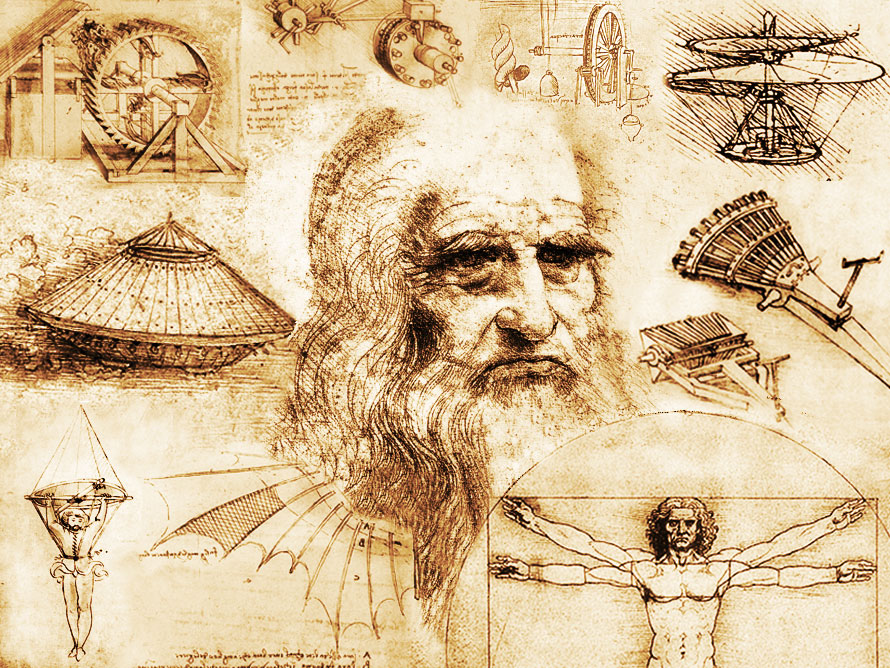Will there ever be another Leonardo da Vinci? He is known around the globe for his stunning paintings. But the Renaissance figure also pioneered new ways to understand the world.
Leonardo: Artist, scientist, hipster, genius
Will there ever be another Leonardo da Vinci? He is known around the globe for his stunning paintings. But the Renaissance figure also pioneered new ways to understand the world.
Code for success
Italy, late 15th century. Walking the streets is a young vegetarian, probably gay, who has avoided university in favour of learning through "experience". He wears a lot of pink. Friends describe him as graceful and good looking, with "beautiful curling hair".
More than 500 years after Leonardo da Vinci's death, we generally picture him as an old man. But in his youth, he was remarkably ahead of his time, right down to his "hereticalAn opinion against established or usual beliefs, especially relating to religion. " questioning of religion. Today, he would probably be called a hipster.
Leonardo was the illegitimate son of a well-off notarySomeone responsible for managing legal paperwork.. As a result, he had little formal education and "could barely read Latin or do long division", according to his biographer Walter IsaacsonHis book Leonardo da Vinci: The Biography was published in 2017. He has also written biographies of other great minds, including Einstein, Ben Franklin and Steve Jobs.. But at the age of 14, he was sent to train with the artist Andrea del Verrocchio in Florence. By 20, he qualified as a master in his own right.
He had trouble finishing projects. Fewer than 20 of his paintings remain, although they are some of the most famous in history - particularly the Mona Lisa and The Last Supper. In November 2017, a restored portrait of Jesus Christ, called Salvator Mundi, became the most expensive painting ever sold.
Yet Leonardo was not just a painter. As a true Renaissance manThe Renaissance was a period of European history between the 13th and 17th centuries. "Renaissance men" are known for being skilled at a number of varied subjects, instead of specialising in just one., he was also an engineer, scientist, mathematician, philosopher and musician. Unlike today, these subjects were all seen as related. But he did not just dabble in other pursuits - he mastered them. His anatomical drawings picked up on details that scientists still use for learning today.
His notes show that he worked tirelessly to make connections that previous scholars had missed. Leonardo was obsessed with understanding how the body worked, and surmised correctly that life's mechanisms were beyond the reach of his eyesight.
These studies of the human body helped to improve his art, too. "Only through the work he put into dissecting corpses and studying muscles was he capable of painting the Mona Lisa's smile," writes Blake Morrison in The Guardian.
It was not just the human body that piqued Aroused or provoked someone's curiosity. Leonardo's curiosity. He was fascinated by the natural elements, especially water, and throughout his life spent hours drawing spiral forms in an attempt to figure out the maths behind the flow of streams that descended into the Arno River.
His inventions were rarely tested. But looking at them now, you might think he had glimpsed the future. He sketched designs for flying machines, parachutes, helicopters, scuba gear, tanks, machine guns and even a tennis racket.
"He was the epitome of the universal mind," writes Isaacson. "One who sought to understand all of creation, including how we fit into it." His first biographer, 16th Century writer Giorgio Vasari, went even further, suggesting his talents were sent directly from heaven.
For Vasari, Leonardo's work was so extraordinary there could only be one possible conclusion: "Everything he does clearly comes from God rather than from human skill."
Yes: Leonardo was clearly an extraordinary and talented man. But there have been many individuals who have been awarded the title "genius" throughout history. Another Leonardo will come.
No: His genius cannot be replicated. People would come to watch him paint in order to witness a miracle. No one can master so many disciplines, from art to engineering to philosophy, like Leonardo da Vinci.
Or... We should focus on what Leonardo taught us, from the connection between the sciences and the humanities to the huge power of curiosity. Leonardo cannot live again, but his way of thinking can.
Will there ever be another da Vinci?
Keywords
Heretical - An opinion against established or usual beliefs, especially relating to religion.
Notary - Someone responsible for managing legal paperwork.
Walter Isaacson - His book Leonardo da Vinci: The Biography was published in 2017. He has also written biographies of other great minds, including Einstein, Ben Franklin and Steve Jobs.
Salvator Mundi - The painting sold for a record $450 million to a Saudi Arabian prince. Its whereabouts is currently unknown.
Renaissance man - The Renaissance was a period of European history between the 13th and 17th centuries. "Renaissance men" are known for being skilled at a number of varied subjects, instead of specialising in just one.
Piqued - Aroused or provoked someone's curiosity.
Leonardo: Artist, scientist, hipster, genius
 Polymath: Leonardo produced over 7,000 pages of notes and drawings in his lifetime.
Polymath: Leonardo produced over 7,000 pages of notes and drawings in his lifetime. Glossary
Heretical - An opinion against established or usual beliefs, especially relating to religion.
Notary - Someone responsible for managing legal paperwork.
Walter Isaacson - His book Leonardo da Vinci: The Biography was published in 2017. He has also written biographies of other great minds, including Einstein, Ben Franklin and Steve Jobs.
Salvator Mundi - The painting sold for a record $450 million to a Saudi Arabian prince. Its whereabouts is currently unknown.
Renaissance man - The Renaissance was a period of European history between the 13th and 17th centuries. "Renaissance men" are known for being skilled at a number of varied subjects, instead of specialising in just one.
Piqued - Aroused or provoked someone’s curiosity.
